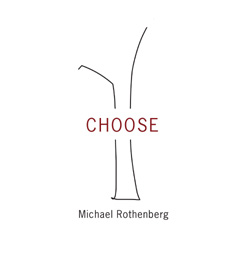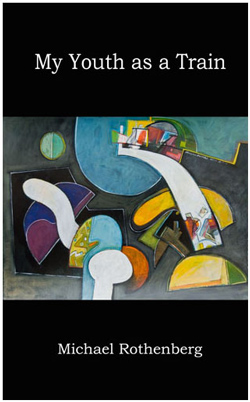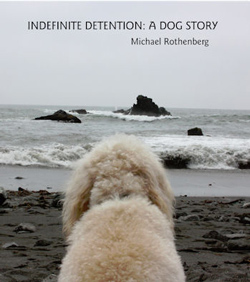


Reviewed June 1, 2014 by Dale Smith.
Being Michael Rothenberg
Michael Rothenberg has contributed in important ways to modern and contemporary writing as an editor and advocate for the New American Poetry. Through his relationships with Penguin Books, we are fortunate to have selected volumes published over the last decade by writers who formed crucial roles in mid-century American poetics, including Philip Whalen, Joanne Kyger, Alice Notley, David Meltzer, and Edward Dorn. Rothenberg’s editorial efforts with Wesleyan University Press also resulted in the astonishing and delightful Collected Poems of Philip Whalen, establishing a record of poetic gesture, visual performance, and cultural engagement in a large and playful volume composing a master poet’s lifework. Rothenberg’s attention to a mostly California and Midwest-based group of writers who came into national prominence in the 1950s and ’60s has made available an experience of writing that found prominence through experimentation with performative vocal structures; complex presentations of subjectivities; strong public gestures; and intense evaluations of the attitudes and actions composing civil society. As a connector of cultural performers to new audiences, Rothenberg’s attentive focus to poetry has led him, moreover, to publish the web magazine, Big Bridge, and through his efforts there he enables new voices and conversations to emerge in relation to the poetic past that informs contemporary actions in poetry today.
While these services to contemporary poetry have helped situate Rothenberg as an important editor, he is a poet in his own right, too. As an artist, he is concerned especially with the subjective inquiries of one’s experience that reconstitute and extend the performative features of the New American poetry he admires. His work also conveys strong political features that acknowledge the troubling relationships of subjective experience with geopolitical order. Consider, for instance, a poem from Choose (2009) that resembles certain features of Philip Whalen’s work, particularly in the performance of a slapstick vocal registry:
It has nothing to do with us
It has everything to do with tattooed lips, suicide prevention,
dragons, cross bones, red stars & sacred hearts. It has nothing to do
with us. It has everything to do with pool halls, Irish whiskey,
Coca-Cola, the house rules. Local boys grumble, lose quarters
in the juke box. Spoons of cappuccino froth at closing time
in the Blue Danube Café. The Danube, the nearest body of water
when Narcissus and Echo go to town.
The self-negation performed in this stanza lets Rothenberg amplify phenomenal details of experience and memory in the creative play of the imagination. The quasi-logical impetus of the poem moves attention away from the lyric self to comment on relationships between poetry and larger social conditions. If “[i]t has nothing to do with us,” then for Rothenberg “[i]t has everything to do with all we’ve seen, heard and felt.” His adherence to phenomenal relations grounds poetry in a fidelity to an imagination that is shaped intimately in the ratios of experience: the poems move according to frank disclosures that rebound in poetic language with new spiritual possibilities. As Narcissus and Echo enter the poem the argument becomes more apparent, for what’s at stake is an acknowledgment of spatial forces: in the words of Narcissus to Echo, “It has everything to do with moments unresolved….” The sense of discourse unwinding in apparent relation to desire situates the poem’s progress in an alert self-understanding that adheres to feeling and yet submerges the ego in an attempt to heighten poetic perception.
In “Night Music,” Rothenberg more poignantly announces the sense of self-sloughing he experiences and addresses through poetry. He writes:
I used to be someone else
Out for a cigarette
Bourbon & weed
Someone else
Trains & high blue desert sky vibrations
Dancing highway power lines.
The sense of self-distance is mediated through the factual details of experience. But if the phenomenal pressure to account for experience inaugurates also a kind of obsession with the self and its placement among others, Rothenberg also acknowledges the more pragmatic realities in which the poet works. “[A] man’s got to do what a man’s got to do,” he says with critical self-reflection in “Choose.” “So we take what’s left and split it / Take what’s left and split / Until everything is in ownership….” The freedom of self-expression can be reined in by the significant properties through which identifications are made apparent. Perhaps this is why Rothenberg keeps Narcissus in mind as a feature of liminal experience. Subjectivities are always in danger of erupting and transforming the phenomenal presentations a poet encounters. In “Narcissus,” a travel daybook in verse, Rothenberg’s entries concentrate on mundane details of landscape, like “Weathermen expect heavy thunderstorms for east Colorado,” or “Bug corpse graffiti on windshield….” But there are gestures here too that make inquiries into the unpleasant problems of self-control, management of “properties,” and the social or political orders imposed on place. “No one knows who’s in control,” Rothenberg writes.
Accordingly, there is a strict attention to a hermeneutics of the subject, a restless, wandering, sometimes undisciplined pressure, to transport perception of experience through the reflective dimensions of subjective stress. In other words, relations of self to things establish an inquiry Rothenberg’s poetry often performs. Being (a loaded, contested, and infinitely rich and ponderous word) provides the source of his scrutiny in poetry. Politically conscious, “being” in this sense forms relations in many vectored senses, moving out. The social problems of others become the poet’s concerns because the distance between us and others remains slight, as Rothenberg suggests: “While skull-faced children search for their fathers / In the rubble of alcohol and war // Mothers raped in the name of the holy mother // A shadow recites the Lord’s Prayer / Masturbates to a photograph of a tantric goddess / God never answers.” The complex movement of the thought-perception here signals a concern with the broader civil order even as the terror of “ground zero, body bags / Ten thousand deaths” presses upon the subjective traces of the poet’s ability to organize, sounding out, or pursuing in the rhythms of an American vernacular, a sense of the sublime and terrific closeness of the self to what it observes. The journal-poems in My Youth as a Train locate the velocity of experience in the tenacity and reflective adventure of self-discovery through the eyes and visions of other people, objects, and events. In taking on the responsibility of the self as it is known through the work of New American confidants like Joanne Kyger, Philip Whalen, or David Meltzer, new foregrounds emerge in the field of being Michael Rothenberg.
In his most recent publication, Indefinite Detention: A Dog Story (2013), Rothenberg more fully invests his creative energy in a political stance. The uses and misuses of politicized art have been debated throughout the twentieth and early twenty-first centuries, most notably blowing up in the correspondence of Denise Levertov and Robert Duncan (and again recently in the published letters of Amiri Baraka and Edward Dorn). The rhetoric of advantage politicized poets and visual artists so often seek in their writing (the maimed children, the napalmed girl, the summoning of indignation) can indirectly sabotage political intent with an interminable pathos that confirms the values of those who already agree with the author. Such writing, however, does little to press beyond the party line to insist on new resonances of feeling and action from the opposition. How do we maintain our convictions even as they are twisted into an art of what Kenneth Burke called “pure persuasion,” an address beyond the current satisfaction of our feelings in order to unsettle and disturb the democratic mind? “Maybe I Want to Go to Canada,” a prose poem about remorse over American democratic systems, satirizes the dream of finding something better somewhere else, as if democracy’s promise could be fulfilled in the neoliberal present. Rothenberg announces, “I’m fresh out of patriotism. Tired of disappointment and hurt. I need a bigger world view. O, Samsara! Let it go, let it go! Ziggy, my dog, sleeps in the sun. Everything will work out here at home. But no, there are 17 countries more Democratic than this one. I want to go there!” A few lines later he says, “It doesn’t matter where as long as I’m free. Hello better democracies!”
The sentiment has been expressed often enough by certain liberals in the US to now be swallowed into the quicksand abyss of cliché. And in an era when democracy is mandated to be the only legitimate form of government in the world, I wonder how good it really is in all those other places. Is it possible that a land in this world exists that is not crippled by the symbiotic circle-jerk of democracy and capital? What little slice of the world is not opposed by the theocratic intrusions of states, by debt burdens imposed through financial dictatorship, and by unison political and economic practices that have led to compulsory forms of global democracy? Rothenberg follows up the poem with the title sequence of his book, “Indefinite Detention: A Dog Story.” The speaker of the poem walks with “Ziggy,” the “Poet Dog,” to meditate on “faith” and “stewardship.” Rothenberg writes:
Faith is convulsive. Sick & poetic
Ziggy wants to go outside. I want to hide
Away from the hustlers and politicians
The transactions of reckless schemers
Reductive artifacts
Contract services and child labor
30 million vote for their favorite
X Factor™ Singing Star
Only 800 sign a petition to free
The Tibetan Poet from his Chinese prison
The poem continues by showing the poet and his dog walking through mythical, literary, and geographic realities, filtering the experience of global repression through the terms of a diverse spiritual perspective that includes “Zarathustra and Hercules / Do-gooders enslaved at the arch.” Through the figure of Ziggy, the poem tries to undermine its obsession with belief in something better “out there.” Instead, we read performances of outrage, Rothenberg asking,
How many of the 99% paid 30 dollars to see
Elizabeth Taylor’s Diamonds?
“How many of the 99% go to Rockefeller Center to see
The million dollar Christmas Tree?
My hands shake
My head shakes all the way down to my toes
I’m talking to my self when no one’s looking
I begin with this word, “Listen!”
Talk myself into perspective
But there’s no time for love
Rothenberg’s mixture of tenderness and outrage, of political obsession and self-introspection is unsettling. These are things we all know, or perhaps have even felt at times, alone in our corners of darkness. And yet the powerlessness to act, if addressed seriously, would be debilitating. Edward Dorn responded with laughter, and wittily expressed an antithetical disposition. This could be disturbing because its premise was based on a commitment to active self-exposure and inquiry as potentialities in the making of a protective amulet that could save you from permanent spiritual detainment. Joanne Kyger, on the other hand, can often pitch a phrase of such political discontent so that we hear it new, and in relation to our own uninspected attitudes. Rothenberg’s take is more wary, perhaps resigned. The interface of war with the domestic can be a burden insofar as the unsettling potential in his writing here mutates into the publication of his own unsettled design. I read “Groggy” as a kind of yielding meditation that acknowledges the impossibility of agency for a poetics of political engagement: “War and missing weapons / Weapons and missing limbs / News and missing ballots / Democracy and missing // Terri, // missing democracy, both of us // Far away.” The forlorn state of one’s feelings for democracy can be forgiven, even as self-awareness, despair, humor, and outrage are magnified throughout “Indefinite Detention,” which I take as the indefinite state of the poet’s own detained spiritual reality. Has global democracy come to contain us all under its promises of an endless distribution of words and signs sustained by endless war? “Oh, this aching world!” Rothenberg writes, “I must get over it quick!” The self-aware humor prevents the book from teetering into embitterment, and instead the poems reach far out toward a new sense of wonderment.